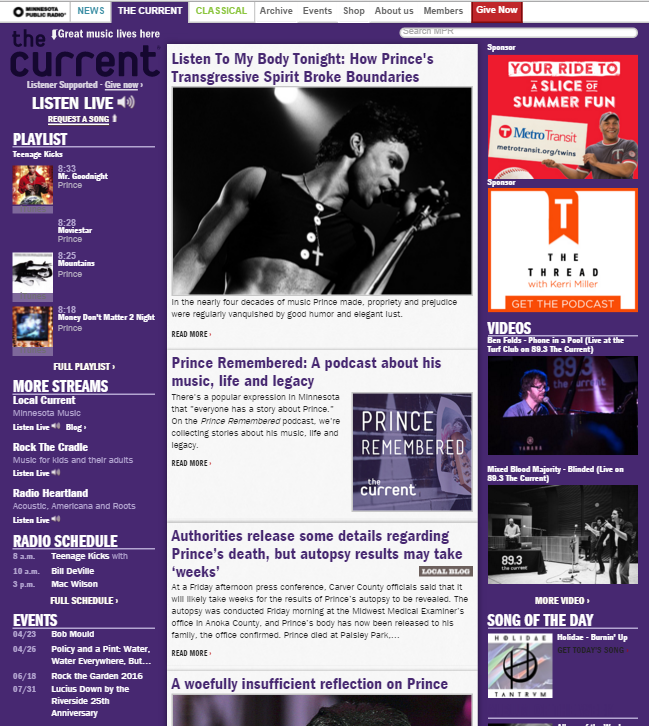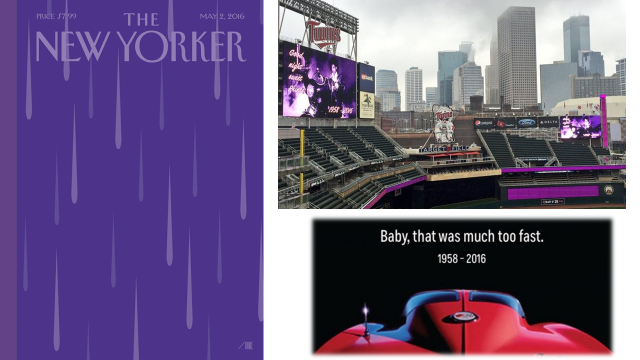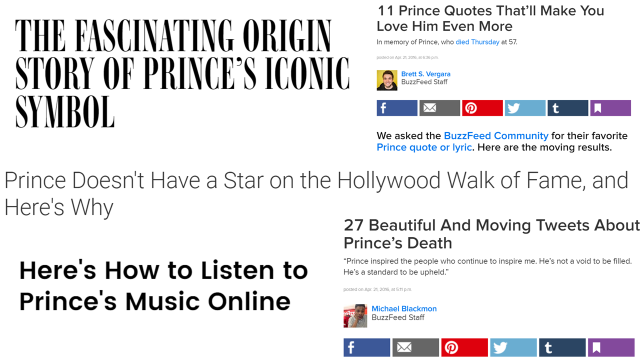![]()
With less than a third of 2016 in the books, it’s shaping up to be a challenging and tragic year for the Rock community. David Bowie, Glenn Frey, Paul Kantner, and now Prince have all passed away this year, often leaving radio in a lurch, due to a combination of difficult timing and a lack of preparation.
While both Bowie and Frey’s deaths were surprising because news of their shaky health situations were kept quiet, the news about Prince last week was especially shocking, due in part to the fact that he was touring, but also because he was just 57 years old. We don’t expect icons that young to suddenly die, much less a guy who seemed to give off a vibe that he seemed to defy the aging process and came off as invincible.
Looking back on the way that radio and the media reacted and covered Prince, there are clearly a number of things to learn about his passing that can hopefully better prepare everyone for “the next time.” In fact, we’ve come up with seven key observations, starting with the reality that…
1. This will keep happening.
I am not a seer nor do I have any special insights. But when so many Rock and Classic Rock core artists approach or reach their seventh decade on this earth, we have to expect there will be more obits to come, if not later this year, certainly next. And that means that radio stations have to cope and deal with these events that mean so much to the audience.
Not to sound opportunistic or gruesome, these are moments when radio can prove its mettle, showing off its unique abilities at times when listeners are emotional and in need to share their feelings. These are big opportunities for radio to build brands, be there for listeners at a key time, and garner strong ratings, too. And these are also times when radio can do what Pandora and Spotify cannot – truly connect with an audience at an especially meaningful and poignant time.
2. Go purple or go home.
It’s not enough to simply start playing that artist’s music wall-to-wall. It’s essential to make a statement and not bury the news on a web page or listed out as just another story in a web blog. Many listeners find out about these tragic events at different times. They might hopefully visit a station website to learn the news. It’s essential to make it easy to find information, but also to make it clear your station is connected to the event.
Many stations around the country moved quickly into Prince mode. In the Minneapolis/St. Paul area, many stations did an admirable job of honoring a local hero on the air and online. But perhaps the best and most extensive Prince tribute coverage was put together by The Current, the Triple A station that’s part of the Minnesota Public Radio group. They jumped on Prince just after noon on Thursday, and stayed with that programming throughout most of the day. The next evening, they moved into Prince A-To-Z. Their entire site was all things purple, covering the passing of a local icon with wall-to-wall intensity. As Prince himself once said, “A strong spirit transcends rules.” He was an excessive, flamboyant artist. At times like these, over the top is the winning approach.

3. Be prepared.
It’s become more than obvious that radio is often ill-prepared for these events, lacking sound bites, graphics, and other assets that can be quickly deployed online and on the air. A readiness plan of action for emergencies is something that all stations should have, but these Rock N’ Roll tragedies are especially key for stations in the format. This is the time to step up and make a statement at a key time. Many companies own multiple Rock and Classic Rock/Hits stations, creating opportunities for staffs to pool their resources. Yet, few have this type of plan in place. Again, 2016 has been a proving ground for radio, and many stations have failed to pass the test.
4. It’s about relationships.
Especially when it comes to musicians, concert promoters, and band managers in your hometown, the time to work connections and forge relationships isn’t when there’s a rock star death – it’s in the years before. The aforementioned Current, in particular, had a previous relationship with Prince, making navigating emotional times easier to manage and negotiate. You never can anticipate when a tragedy like this may happen, but you can lay the groundwork with trust and connections. When something like this happens, you need to know who to contact and what to expect.
5. Any brand can make a statement.
You don’t have to be a Rock ‘N Roll station to convey a message. And the reverse is true. A radio station can also do the same when any famous person passes. It’s a matter of being in the moment, and recognizing how your community is feeling.
Great examples of smart, timely, and tasteful acknowledgments of Prince’s passing were made by many brands last week, including Chevrolet, The New Yorker, and the Minnesota Twins.

6. Show up.
The Current made a decision early on when there was confusion about exactly what transpired at Paisley Park to just head over there. Sometimes you have to follow your instincts and just get on site. In this case, fans already were gathering. The Current benefitted from being there early, especially when TV trucks began to show up. Having expertise and that prior connection to the artist helped, too.
Like a lot of these tragedies, the first details are fuzzy. It’s not often clear exactly what happened. That was the case with Prince when TMZ was first to break a story that all the big news machines, from the Associated Press to Reuters to The New York Times simply waited to be sure they had it right. Showing up can put you in closer touch with the key players, putting your station in a position to find out first (or early) exactly what’s going on.
But it is also about that carpe diem instinct – understanding when that moment arrives where you just have to go for it, and “seize the day.” This is where stations with locally based programmers and live personalities have a decided edge.
7. It’s all about treatment.
When every media outlet under the sun is covering an event of this magnitude, brands can still stand out by creating clever and timely pieces of content that will keep listeners interested engaged. BuzzFeed does this especially well, but a look around the web revealed some fascinating coverage of Prince that made it interesting for fans and even casual observers to dig in and learn more.
Sometimes, it’s a matter of simply doing some Google searches. A staff brainstorm can help to identify great treatment avenues, too. You may not know you have an uber fan on staff who can help guide treatment.
Note that crowd-sourcing material can help, too. The BuzzFeed feature below about Prince quotes were all generated by their readers. All they had to do was curate the best eleven. And many of the other stories I pulled here are fascinating, creating more interest in the artist and this event, while also engaging an audience.
Radio keeps preaching that content is king. And of course, it is. But these are the moments when everyone has to be involved, present, aware, and invested. Stations have to be proactive and step up with memorable content, and not just dust off the artist’s catalog.

For next time, it’s not a question of if, but when. Many in radio can learn from Minneapolis area stations like The Current to role play what they’d do during a similar crisis. Reputations and brands can be made during these times. Handled with a deft and creative touch, listeners might be talking about your coverage for years to come.
When something momentous happens, it’s crunch time.
Carpe diem.
- Media And Technology In 2025: Believe It Or Not! - April 18, 2025
- In Radio, You Just Never Know - April 17, 2025
- The Secret To Making A Great Podcast (And Great Radio) - April 16, 2025




Excellent article. As for #3, “Be prepared,” here’s a sports analogy that you might find useful. https://www.nytimes.com/2016/04/06/sports/ncaabasketball/villanova-national-championship.html?_r=0
Bruce, this is a great article (congrats on Nova again!), and it speaks to the need to prep, drill, and train. All these situations may differ in some respects, including the magnitude of the star, etc. But the need to know what a station and its personalities are going to do when it’s “crunch time” is a key to executing when it counts. Thanks for bringing this to our blog.
This is an area where we should follow our other media brethren…Television and print both have “significant” figures obits on a spike…packages put together waiting for dates and ready to go…They get updated with any new info every 3 months or so just in case, but all of the material and info is ready…It’s staff intensive and in the case of Prince…57 is awfully young, but it’s worth a thought.
Mike, you are so right. They’re gruesomely called “morgues,” but they are effective. Although as you point out, most news organizations probably did not have one prepared for Prince. Thanks for commenting.
These are all very good points, and I’d offer kudos to Louisville’s WFPK for being all over this as well. But you are missing one very important point. Radio can’t change on a dime anymore. When EVERY minor programming detail must come from corporate, most radio stations can’t break format. And if they do without permission from corporate, someone’s gonna be losing their jobs. Smaller radio stations are much more nimble when things like this happen. The station I own in southern Indiana, being a country music station, was all over Merle Haggard’s death. One three Haggard songs and hour and a special program from Rowdy Yates was broadcast that Saturday and repeated on Sunday. I didn’t have to check with corporate to do this. We just did it. Unless radio rethinks and changes this top down model that’s currently in place, corporate commercial radio will always be caught flat footed when things like this happen.
Scott, thanks for the comment, and the mention for WFPK. I believe that with some organizations, you are right. But many others truly cede these types of “audibles” to local management. Appreciate you taking the time to read our blog.
Something like this is a great opportunity for a large company to pool its resources. Every station cant’ fly someone out to Paisley Park, but every major group can send a small team out there to do live shots for its stations. There should be a “red button” plan, including Mike’s suggestion to have obits and a game plan in place, so that when something happens some plane tickets and hotel rooms are all that’s needed.
I’m actually amazed that the top 10 radio companies didn’t have someone at Paisley Park within hours of the announcement. Shared among all participating stations, the cost would have been a couple hundred dollars each, at most.
These are huge opportunities for radio to make a difference, as you point out. For bigger companies with multiple music stations (pop, country, rock), there’s no reason why better preparation couldn’t be happening. Thanks, Bob.